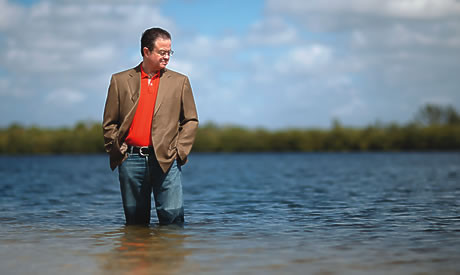SHARE:
One Last Big Push for Phosphate Mining
South-central Florida's landscape will be shaped in large part by a company many residents have never heard of. Mosaic is the only big player left in Florida's phosphate industry, and it controls more than 300,000 acres.
 “The Peace River is the No. 1 water supply for the people of southwest Florida and the No. 1 water supply for Charlotte Harbor, which provides a $4.5-billion economic impact to the regional economy,” says Tampa lawyer Ed de la Parte. “That is a bigger economic impact than the phosphate industry itself has on the state of Florida.” [Photo: Jason Smith] |
For years, attempts by the counties and Mosaic to work out settlement agreements went nowhere. In spring 2007, Mosaic tried again, approaching local governments with what the company called a compromise: The company would accept stricter regulations and broader oversight, would promise not to mine in the Peace or Myakka river flood plains, and would offer land for a major drinking-water reservoir for the region. In exchange for a dispute resolution process, opponents would have to drop current and future legal challenges, as well as comments to permitting agencies.
As it negotiated, Mosaic launched a mammoth PR strategy. As it had elsewhere, it hired goodwill ambassadors who live in local communities. The company also blitzed local TV stations with ads extolling the value of phosphate to the nation’s farmers. It engaged in some less savory tactics as well, such as trying to get Charlotte County to ditch de la Parte, the lawyer representing the county against the industry.
Mosaic’s everything-is-going-to-be-fine message became so ubiquitous that some opponents nicknamed the company “The Matrix,” a double entendre on the geologic layer containing phosphate rock and the science fiction movie in which humans live in a virtual-reality world controlled by a computer.
Among other complaints, Charlotte County Commissioner Adam Cummings says the agreement “amounts to a 35-year gag order on Charlotte County. It strips of us our right to have our concerns addressed by permitting agencies. It strips us of our right to be compensated for any damage that may occur as a result of existing mines. It even strips us of our right to free speech.”
A majority of his colleagues disagreed late last year when they voted to accept the settlement, believing it will bring the county more than it could win through litigation. After taking on the lion’s share — some $12 million — of the area’s legal challenges over the years, commissioners also said the county could no longer afford to foot legal bills for the entire region.
While Mosaic officials call the millions spent a waste, even some who support the industry say the legal challenges will produce a much smaller mining footprint and increased environmental protections. One challenge led directly to DEP cracking down on mining streams, another to much higher requirements for financial security; miners have to post bonds equal to 110% of the value of wetlands they have to restore.
Mosaic still must convince Lee and Sarasota counties and the water authority to sign on to the agreement. At the moment, that appears unlikely: Negotiations have come to a standstill, and many officials up for re-election wouldn’t mind if things stay that way until after November. Sarasota County Commission Chairwoman Shannon Staub, a popular Republican with a green reputation, is one of the few willing to express support for the compromise even as she defends her seat.
“Mosaic knows that I’m not their biggest fan, but I’m a realist,” Staub says. “You can get further talking and negotiating than you can with lawsuits. An administrative judge would have never made them donate all the conservation land they have around the creeks and wetlands, would never tell them to give up land for a reservoir.”























